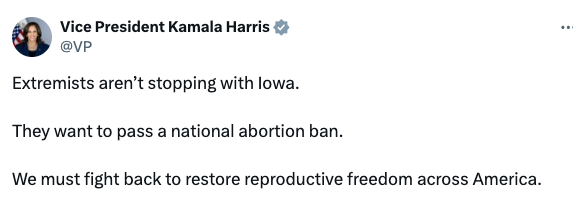Trump Abortion Bans And The Race In Texas

On Monday, a six-week abortion ban went into effect in Iowa. The Midwest state is now the 22nd to enact some form of an abortion ban since Roe v. Wade was overturned in 2022.
Following the newest state abortion ban, the Democratic National Committee convened a press call to discuss what they refer to as “Trump abortion bans.” As she campaigns for President, Kamala Harris has repeatedly invoked the phrase. She released a video about Iowa, saying “what this means is that 1 in 3 women of reproductive age in America lives in a state with a Trump abortion ban.”

As she crossed into her second full week campaigning for President, the ripple effects of Harris’s emphasis on reproductive freedoms are being felt in Texas. One of the participants on the DNC call was Amanda Zurawski. She endured catastrophic complications with her pregnancy after 18 weeks in 2022, days after the Dobbs decision and months since Texas enacted its vigilante anti-abortion law Senate Bill 8.
Zurawski did not receive a medically necessary abortion until after she was hospitalized in the ICU twice after going through septic shock. On the call, she recounted that even after she woke up from her harrowing experience, she realized she was “lucky” because she lived. Talking about Donald Trump, who often brags about appointing the three Justices to the Supreme Court who made it possible for Roe to be overturned, she chastised him for celebrating abortion bans like the one in her home state of Texas. “It’s unthinkable to me that anybody could cheer on the cruel abortion bans that nearly cost me my life,” said Zurawski.
State Representative Donna Howard, who is a nurse and the Chairwoman of the Texas Women’s Healthcare Caucus, said on the call that in Texas women like Zurawski are being “pushed to the verge of death” because doctors cannot provide care that used to be available before the state’s abortion ban. “This is barbaric, and it does not need to happen,” said Howard.
Howard also cited several devastating consequences beyond what women like Zurawski have to endure because of the state’s abortion ban. Howard pointed out that the infant mortality rose in the state, and for the first time in fifteen years the teen pregnancy rate increased.
Howard also focused her time on the call to note that a potential second Trump administration would have ramifications beyond a national abortion ban. She cited passages from Project 2025 that advocate for slashing access to contraception, banning IVF, and even monitoring pregnancies.
The Signal asked Zurawski what it was like now campaigning for a candidate like Vice President Harris, who uses the word abortion, and has centralized her message on abortion access. Zurawski said that having Harris anchoring the campaign gave her “an immense amount of hope.”
Zurawski highlighted that Harris has actually been running on a whole platform of reproductive freedom, citing her commitment to protecting IVF and access to contraception as well as restoring abortion rights. She also said how it was freeing to see a candidate talk so openly about abortion, when in the past that topic might have been only obliquely referenced. “It’s giving folks across the country permission to talk about their own experiences, whether it’s around the kitchen table or on a press conference like this,” said Zurawski.
Howard echoed Zurawski’s feelings about Vice President Harris. She described the excitement as “palpable.” Howard also spoke about remembering a time before unmarried women could even access birth control or open a checking account without the permission of a man. She said that Harris understood what was at stake and was committed to ensuring “we aren’t going back.”
Comments ()